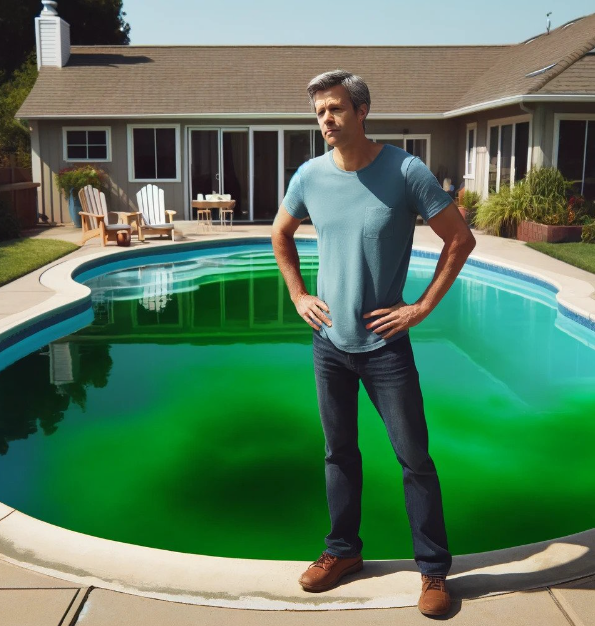Ah, the allure of a sparkling fiberglass swimming pool in your backyard. It beckons you with cool refreshment on a hot day, a place to unwind and create lasting memories with family and friends. But maintaining that pristine oasis can feel like a mystery. Fear not, fellow pool owner! Here’s the inside scoop on common mistakes to avoid when keeping your fiberglass beauty in tip-top shape.
- Is Shocking My Pool Every Day Really Necessary?
- Can I Just Let the Leaves Pile Up in the Skimmer?
- Is a Pool Vacuum a Luxury or a Necessity?
- Should I Just Let the Pool Run All Day Long?
- I Don’t Need to Cover My Pool When It’s Not in Use, Right?
- Ignoring Low Water Levels: A Big Mistake?
- Can Harsh Chemicals Damage My Fiberglass Pool?
- Ignoring Algae: A Slimy Mistake
- Neglecting Pool Equipment: A Costly Oversight
- Skipping Winterization: A Risky Gamble
- Overlooking Professional Maintenance: A Potential Pitfall
- Don’t Fall for These Pool Maintenance Myths
- Conclusion
Is Shocking My Pool Every Day Really Necessary?
Not quite. Daily shocking, a process that uses chlorine to kill bacteria, might seem like the ultimate safeguard, but it can actually backfire. Over-shocking throws your pool’s chemical balance out of whack, irritating swimmers’ eyes and skin. The key is consistency. Test your pool’s chlorine levels regularly (ideally weekly) and adjust the shock dosage accordingly.
Can I Just Let the Leaves Pile Up in the Skimmer?
Tempting, right? But a skimmer overflowing with leaves is a recipe for disaster. Leaves decompose in the water, releasing phosphates that fuel algae growth. Yuck! Make it a habit to empty the skimmer daily, especially after a storm.
Pro tip: Invest in a pool net to scoop up leaves before they reach the skimmer.
Is a Pool Vacuum a Luxury or a Necessity?
Think necessity. Fiberglass pools, despite their smooth surface, still accumulate debris like dirt, pollen, and dead skin cells. Without regular vacuuming, this debris can settle on the pool floor, not only looking unsightly but also potentially staining the surface. Aim to vacuum your pool at least once a week, focusing on the bottom and walls.
Here are some additional vacuuming tips:
- Choose the right vacuum: There are manual, automatic, and robotic pool vacuums on the market. Consider your pool size, budget, and personal preference when making your choice.
- Don’t forget the corners: These areas are prime targets for debris accumulation, so pay extra attention to them during vacuuming.
Should I Just Let the Pool Run All Day Long?
Nope. While it might seem logical to keep your pool circulating continuously, it’s actually an energy waster. Most pool filters are designed to run for a specific amount of time each day, typically 8–12 hours. This ensures proper water circulation and filtration without breaking the bank on your electricity bill.
Here’s how to determine the ideal filtration time for your pool:
- Pool size: Larger pools generally require longer filtration cycles.
- Climate: Warmer climates often necessitate longer filtration times to combat algae growth.
- Bather load: If you have a lot of swimmers using the pool, you might need to increase filtration time.
Consult your pool manual or a pool professional for specific recommendations on filtration time for your unique situation.
I Don’t Need to Cover My Pool When It’s Not in Use, Right?
Wrong. A pool cover is more than just a pretty accessory. It serves several crucial purposes:
- Prevents debris: A pool cover acts as a barrier, keeping leaves, twigs, and other debris from entering the water. This saves you time and effort on cleaning.
- Reduces chemical evaporation: Pool covers help to minimize the evaporation of chlorine and other pool chemicals, saving you money eventually.
- Deters pests: Mosquitoes and other insects are attracted to standing water. A pool cover discourages them from taking up residence in your backyard oasis.
Invest in a high-quality pool cover that fits your pool perfectly. There are various types of pool covers available, so choose the one that best suits your needs and budget.
Ignoring Low Water Levels: A Big Mistake?
Absolutely. Maintaining a proper water level is crucial for the overall health of your fiberglass pool. Here’s why:
- Prevents equipment damage: If the water level dips below the skimmer or filter intake, it can damage these essential pool components.
- Stress on the pool structure: Low water levels can put undue stress on the pool walls and liner, potentially leading to cracks and leaks.
Aim to keep your pool water level at the midpoint of the skimmer opening. Check the water level regularly, especially during hot, dry periods when evaporation rates are higher.
Can Harsh Chemicals Damage My Fiberglass Pool?
You bet. While chlorine is essential for keeping your pool clean and sanitized, using harsh or unbalanced chemicals can damage your fiberglass surface. Here are some things to keep in mind:
- Read labels carefully: Always follow the manufacturer’s instructions for dosage and application of pool chemicals.
- Don’t mix chemicals: Mixing certain chemicals can have unintended consequences, damaging your pool and creating harmful fumes.
- Maintain proper water balance: Regularly test and adjust your pool’s pH, alkalinity, and calcium hardness levels. Imbalanced water chemistry can lead to scale buildup, staining, and corrosion.
- Opt for fiberglass-safe products: Choose pool cleaning products and chemicals specifically designed for fiberglass pools. These products are less likely to cause damage to the surface.
Ignoring Algae: A Slimy Mistake
Algae is a pool owner’s worst nightmare. It not only looks disgusting but can also create a slippery surface, increasing the risk of accidents. Don’t let it get out of control. Regular brushing, shocking, and maintaining proper water chemistry are key to preventing algae growth.
Here are some signs of algae:
- Green or brown stains on the pool walls and floor
- Cloudy or murky water
- Slimy or greasy feeling water
Here are some tips for preventing algae growth:
- Maintain proper chemical levels: Chlorine is the primary weapon against algae, so ensure your pool’s chlorine level is always within the recommended range.
- Regularly brush the pool walls: This helps prevent algae from taking hold on the pool surface.
- Use an algaecide: While not a replacement for chlorine, algaecides can provide an extra layer of protection against algae.
- Shock the pool regularly: Shocking your pool raises the chlorine level to a higher level, effectively killing algae.
Neglecting Pool Equipment: A Costly Oversight
Your pool equipment, including the pump, filter, and heater, works hard to keep your pool clean and inviting. Neglecting regular maintenance can lead to breakdowns, costly repairs, and even pool closures.
Here are some essential maintenance tasks:
- Clean the filter regularly: Backwash your filter regularly to remove trapped debris. If you have a cartridge filter, clean it with a high-pressure hose or use a specialized filter cleaner.
- Check the pump impeller: Ensure the impeller is clean and free of debris. A clogged impeller can reduce the pump’s efficiency.
- Inspect the heater: Before the swimming season starts, have your pool heater serviced by a professional to ensure it’s operating safely and efficiently.
Skipping Winterization: A Risky Gamble
If you live in a climate with freezing temperatures, winterizing your pool is essential. Failing to do so can result in costly damage to your pool and equipment.
Winterization steps typically include:
- Lowering the water level
- Adding winterizing chemicals
- Covering the pool with a winter cover
Consult a pool professional for specific winterization instructions based on your local climate and pool type.
Overlooking Professional Maintenance: A Potential Pitfall
While you can handle many aspects of pool maintenance yourself, there are times when professional help is necessary. Regular pool inspections and cleanings by a qualified pool technician can help identify and address potential problems before they become major issues.
Consider hiring a pool professional for the following:
- Initial pool startup: A professional can help you get your pool up and running smoothly at the beginning of the swimming season.
- Water chemistry analysis: Regular water testing and balancing are crucial for pool health, and a professional can provide expert guidance.
- Equipment repairs: If your pool equipment malfunctions, it’s best to call in a professional for repairs to avoid further damage.
- Pool renovations: If you’re considering upgrading your pool, a pool professional can help you design and install the perfect oasis.
Bonus Tip: Consider investing in a pool automation system. These systems can help you maintain optimal water chemistry, control your pool equipment, and even clean your pool automatically, saving you time and effort.
Don’t Fall for These Pool Maintenance Myths
There are plenty of myths surrounding pool maintenance. Let’s debunk a few:
Myth: Saltwater pools are chlorine-free.
- Fact: Saltwater pools use a salt chlorine generator to produce chlorine, so they do require some chemical maintenance.
Myth: You can use household cleaning products to clean your pool.
- Fact: Household cleaning products can damage your pool’s surface and upset the water chemistry. Always use pool-specific cleaning products.
Myth: You only need to clean your pool filter when it’s visibly dirty.
- Fact: Pool filters should be cleaned regularly, even if they don’t appear dirty. This helps maintain water quality and prevents filter damage.
Conclusion
Maintaining a fiberglass swimming pool requires dedication and attention to detail. By understanding common mistakes and following best practices, you can keep your pool sparkling and inviting all season long. Remember, prevention is key. Regular testing, cleaning, and chemical maintenance will save you time, money, and headaches eventually.
So, dive in and enjoy your backyard oasis!



